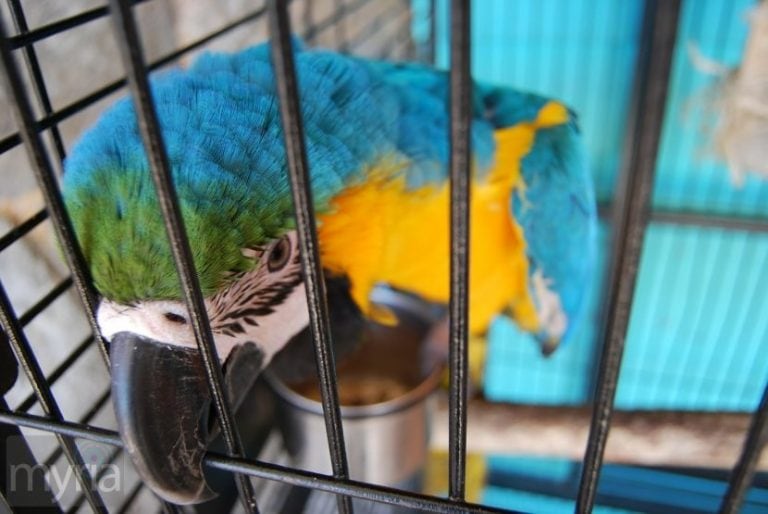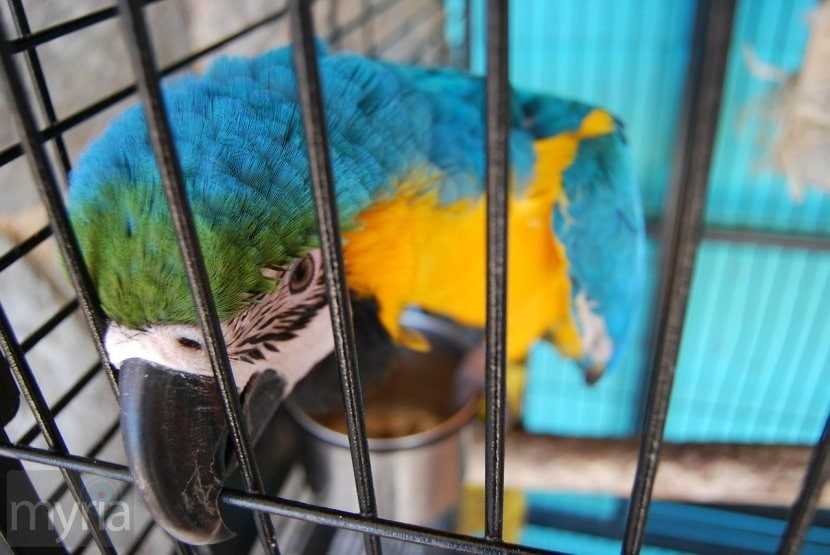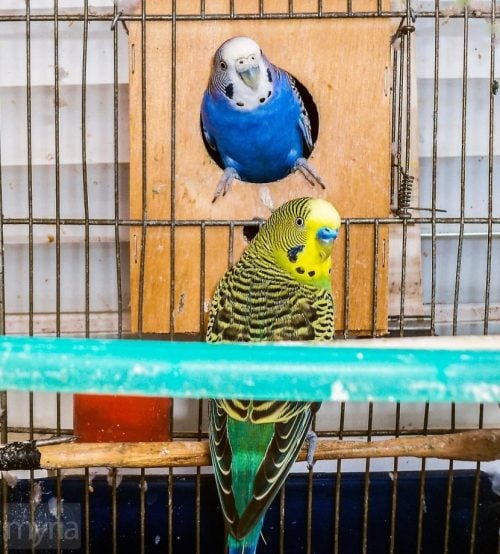Just like there are “cat people” and “dog people” in this world, there are very definitely also “bird people.”
If you’re a fan of our fine feathered friends, but have never had a bird of your own (or may it’s been awhile), here are some important tips and reminders to keep in mind when choosing your next sweet avian buddy — whether parrot or parakeet, canary or conure.
Before choosing a pet bird
- Check your state, local, and property laws before adopting or purchasing a pet bird. Many governments have ordinances against certain pets because of noise, size, or public health risk.
- Identify a local veterinarian who has experience with pet birds to help you keep your bird healthy.
- Find out what types of birds are suitable for your family. Certain types of birds, like young poultry, might not be suitable for young children or people with weak immune systems who are living in the household.
- Learn about the different types of birds and their personalities and attention needs before you bring one home. Birds are very intelligent and social animals that require a lot of attention.
- Research how to properly care for your bird before purchase. Ask your veterinarian about the proper food, care, and enclosure or environment that is best for the bird you are selecting.
- Select a location for your bird’s cage or enclosure. Pet birds need to be housed in a warm, draft-free location that has adequate lighting and is close to activity in the household.
- Be aware that pet birds can shed germs in their droppings. Plan to wear gloves when cleaning bird cages, and wash your hands thoroughly after any contact with the birds or their environment.
>> Pet birds: Keep your feathered friends from getting you sick
Importing pet birds into the United States
- USDA regulates the importation of pet birds. Because of the risk of avian influenza (bird flu), USDA restricts the importation of pet birds from certain countries and enforces a 30-day quarantine for all imported birds except those that come from Canada. People interested in importing pet birds should visit the USDA non-US Origin Pet Bird Importation website.
Choosing a bird
- Match a bird’s attitude, temperament, size, and activity level with your family, your home, and the amount of time you have to spend with your pet.
Pick birds that are bright, alert, and active. Birds should have smooth, sleek, and soft feathers that are free of debris or droppings. Birds who seem depressed, aren’t moving around very much or look dirty may be ill.
- Learn the signs of illness in a bird, which include appearing sluggish or depressed, having ruffled feathers or areas of feather loss, abnormal breathing, and fluid running from its eyes or nose.
- When bringing new birds to a household that already has pet birds, be sure to keep the new birds separated for at least 30 days before introducing them to your existing birds. This will help prevent the new birds from passing disease to your existing animals. During this period of separation:
- Wash your hands with soap and water before working with each group of birds.
- Keep water and food dishes, toys, and other cage/perch equipment separate and clean.
- Within a few days after you buy or adopt your bird, take it to a veterinarian who has experience with pet birds for a health visit and get advice on caring for your new pet. Return to the veterinarian for checkups and beak, nail, or wing trimmings, as recommended.
>> Is a bird the right pet for you?
Housing pet birds
Large bird enclosure for birds to fly.
- Provide a safe, sturdy enclosure or cage for your bird. Keep pet birds from interacting with all wild animals and insects. These animals and insects can carry diseases that can be spread to your pet birds.
- Do not allow your birds to fly or roam around the house unattended. They could get accidentally trapped or hurt.
- Avoid housing pet birds in areas where food or drink is prepared, served, or stored, such as kitchens or dining rooms.
- Don’t let your birds play or be housed close to your reptile pets. Reptiles can pass Salmonellato birds.
- Closely supervise any interaction of your birds with other pets to make sure your birds or the animals don’t become injured in case of a fight.
Cleaning and disinfecting
- Keep bird cages and enclosures clean to prevent the build-up of animal droppings. When cleaning droppings and cages, use disposable gloves, do not pick up droppings with your bare hands, and make sure to wash your hands thoroughly afterwards.
- Clean bird cages and perches outside with a bottle of dish soap dedicated to this purpose, and use clean water.
- Disinfect bird cages after cleaning with either a dilute bleach solution, diluted properly according to label directions, or a commercial disinfectant made specifically for bird cages.
- Don’t clean any equipment or materials in the kitchen sink: This includes cages and feed and water containers. Bacteria and other germs can contaminate your food preparation areas.
- Rinse all cages and equipment well after cleaning. To keep your pet birds safe, it is important to rinse off all of the cleaning and disinfectant residue.
Monitoring your pet bird’s health
- Visit a veterinarian who has experience with pet birds for routine check-ups to keep your bird healthy and prevent infectious diseases.
- If your bird becomes sick or dies within a month after purchase or adoption:
- Contact your veterinarian.
- Inform the pet or feed store, breeder, or adoption organization about the bird’s illness or death.
- Consider waiting before you purchase or adopt another pet to give yourself time to clean any germs out of the cage or perch and to clean bird equipment.
- Do not reuse the cage or enclosure until it has been properly cleaned and disinfected.
- Even though a bird is healthy, it can still spread germs to humans and other animals. If you become sick shortly after purchasing or adopting a bird, make sure to tell your doctor about your new pet.



 Pick birds that are bright, alert, and active. Birds should have smooth, sleek, and soft feathers that are free of debris or droppings. Birds who seem depressed, aren’t moving around very much or look dirty may be ill.
Pick birds that are bright, alert, and active. Birds should have smooth, sleek, and soft feathers that are free of debris or droppings. Birds who seem depressed, aren’t moving around very much or look dirty may be ill.





